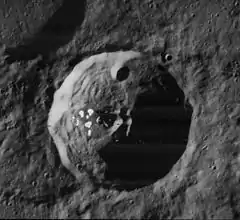 Lunar Orbiter 4 image (Cluster of dots near center is blemish on original) | |
| Coordinates | 77°42′N 14°06′E / 77.7°N 14.1°E |
|---|---|
| Diameter | 56 km |
| Depth | 2.4 km |
| Colongitude | 350° at sunrise |
| Eponym | William Scoresby |
Scoresby is a lunar impact crater that is located in the northern part of the Moon's near side. It is nearly attached to the crater Challis along the north-northwestern rim, and is located just to the north of the walled plain Meton. Due to its location, this crater appears highly foreshortened when viewed from the Earth, appearing elliptical in shape. It is, however, very nearly circular when seen from above.
This formation has a sharp-edged outer wall that has not been significantly worn and is not marked by impacts. It has an outer rampart that extends outwards to nearly half a crater diameter, except where intersected by Challis in the north. The wide inner walls display an appearance of having been terraced, but these have been degraded by a multitude of lesser impacts over time.
Most of the inner floor of Scoresby is level and flat, except in the northeast where it is furrowed by some rough terrain. At the midpoint of the interior is a prominent central peak formation consisting of three mountainous ridges. There is a tiny craterlet just to the west of the central peaks, and a slightly larger craterlet along the northern interior wall.
Satellite craters
By convention these features are identified on lunar maps by placing the letter on the side of the crater midpoint that is closest to Scoresby.
| Scoresby | Latitude | Longitude | Diameter |
|---|---|---|---|
| K | 76.3° N | 2.9° E | 23 km |
| M | 75.6° N | 8.1° E | 54 km |
| P | 75.8° N | 13.0° E | 26 km |
| Q | 77.4° N | 8.7° E | 40 km |
| W | 74.5° N | 11.2° E | 10 km |
References
- Andersson, L. E.; Whitaker, E. A. (1982). NASA Catalogue of Lunar Nomenclature. NASA RP-1097.
- Blue, Jennifer (July 25, 2007). "Gazetteer of Planetary Nomenclature". USGS. Retrieved 2007-08-05.
- Bussey, B.; Spudis, P. (2004). The Clementine Atlas of the Moon. New York: Cambridge University Press. ISBN 978-0-521-81528-4.
- Cocks, Elijah E.; Cocks, Josiah C. (1995). Who's Who on the Moon: A Biographical Dictionary of Lunar Nomenclature. Tudor Publishers. ISBN 978-0-936389-27-1.
- McDowell, Jonathan (July 15, 2007). "Lunar Nomenclature". Jonathan's Space Report. Retrieved 2007-10-24.
- Menzel, D. H.; Minnaert, M.; Levin, B.; Dollfus, A.; Bell, B. (1971). "Report on Lunar Nomenclature by the Working Group of Commission 17 of the IAU". Space Science Reviews. 12 (2): 136–186. Bibcode:1971SSRv...12..136M. doi:10.1007/BF00171763. S2CID 122125855.
- Moore, Patrick (2001). On the Moon. Sterling Publishing Co. ISBN 978-0-304-35469-6.
- Price, Fred W. (1988). The Moon Observer's Handbook. Cambridge University Press. ISBN 978-0-521-33500-3.
- Rükl, Antonín (1990). Atlas of the Moon. Kalmbach Books. ISBN 978-0-913135-17-4.
- Webb, Rev. T. W. (1962). Celestial Objects for Common Telescopes (6th revised ed.). Dover. ISBN 978-0-486-20917-3.
- Whitaker, Ewen A. (1999). Mapping and Naming the Moon. Cambridge University Press. ISBN 978-0-521-62248-6.
- Wlasuk, Peter T. (2000). Observing the Moon. Springer. ISBN 978-1-85233-193-1.